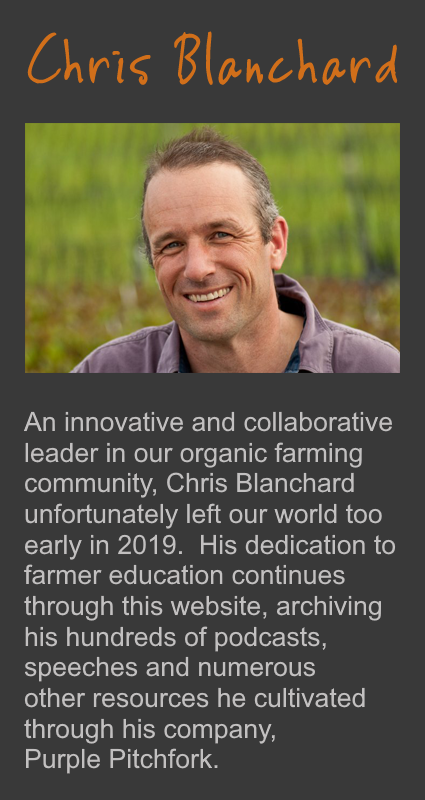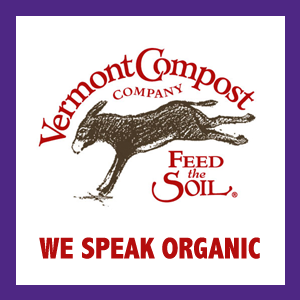When Jack Hedin called me last summer to ask if I would take a look at some transplant production issues Featherstone Farm was having in their greenhouses, I had no idea or expectation that, one year later, Featherstone Farm would occupy such a large part of my time and attention. It’s been a great year, with many exciting and engaging challenges.
In over twenty years of working on and with organic vegetable farms around the country, including thirteen years of farming on my farm, I’ve noticed that most farms and their farmers just plow ahead, making decision after decision on what action to take next to keep the irrigation pumps running, the harvest crews picking, and the tractors in motion without consideration for larger impacts or processes. The race against the weather and the perishable nature of vegetable crops combine with scarce time and monetary resources to create a situation where farmers never get a chance to stand back and evaluate their operations, much less the time to make systematic and systemic changes to build the foundation for future improvements.
It reminds me a bit of parenting.
We put a lot of effort last winter into a rewritten business plan and refinancing. But just as importantly, we worked hard to put processes in place for the financial management of the business on an ongoing basis. Featherstone Farm now has not only a financial plan, it has a system in place for the periodic and timely monitoring of performance to that plan, as well as mechanisms for making corrections and replanning as necessary. Each month, the leadership team meets to review the farm’s income and expenditures relative to the plan – then, where things are not going right, we figure out how to correct them and assign responsibility for following through.
Weekly meetings of the leadership team provide an opportunity to check in and get everybody on the same page about progress made on addressing those financial issues, as well as other issues on the farm. The CSA team meets on a schedule to decide what’s going in the box and what’s going in the newsletter. And every Friday morning, the entire crew has a short stand-up meeting to make certain that everybody’s on the same page about the little and big things that keep the farm running smoothly, from rolling the windows up on the farm trucks and holiday work schedules to the process for reporting accidents and injuries and the importance of communication and teamwork to the farm’s success.
Farming is governed by rhythms and interruptions. We plant, cultivate, and harvest in cycles and patterns big and small, seeding onions in at the end of winter, harvesting lettuce in the cool of the morning. We weather floods and droughts, scramble to solve personnel crises, and shuffle the resources we need to get a critical piece of equipment repaired while the rest of the farm keeps running. And while weekly staff meetings and monthly financial reviews may be a part of many businesses, these larger patterns – independent of nature’s cycles, and recognizing the interface of agriculture with the larger culture of individuals, finance, and governance – occur all-too-rarely in the world of organic and local farming operations. To have the opportunity to join Featherstone Farm’s efforts to harness these processes to further the farm’s goals of making a difference in the world is truly an honor.
Here's the original guest post on Featherstone Farm's blog.
In over twenty years of working on and with organic vegetable farms around the country, including thirteen years of farming on my farm, I’ve noticed that most farms and their farmers just plow ahead, making decision after decision on what action to take next to keep the irrigation pumps running, the harvest crews picking, and the tractors in motion without consideration for larger impacts or processes. The race against the weather and the perishable nature of vegetable crops combine with scarce time and monetary resources to create a situation where farmers never get a chance to stand back and evaluate their operations, much less the time to make systematic and systemic changes to build the foundation for future improvements.
It reminds me a bit of parenting.
We put a lot of effort last winter into a rewritten business plan and refinancing. But just as importantly, we worked hard to put processes in place for the financial management of the business on an ongoing basis. Featherstone Farm now has not only a financial plan, it has a system in place for the periodic and timely monitoring of performance to that plan, as well as mechanisms for making corrections and replanning as necessary. Each month, the leadership team meets to review the farm’s income and expenditures relative to the plan – then, where things are not going right, we figure out how to correct them and assign responsibility for following through.
Weekly meetings of the leadership team provide an opportunity to check in and get everybody on the same page about progress made on addressing those financial issues, as well as other issues on the farm. The CSA team meets on a schedule to decide what’s going in the box and what’s going in the newsletter. And every Friday morning, the entire crew has a short stand-up meeting to make certain that everybody’s on the same page about the little and big things that keep the farm running smoothly, from rolling the windows up on the farm trucks and holiday work schedules to the process for reporting accidents and injuries and the importance of communication and teamwork to the farm’s success.
Farming is governed by rhythms and interruptions. We plant, cultivate, and harvest in cycles and patterns big and small, seeding onions in at the end of winter, harvesting lettuce in the cool of the morning. We weather floods and droughts, scramble to solve personnel crises, and shuffle the resources we need to get a critical piece of equipment repaired while the rest of the farm keeps running. And while weekly staff meetings and monthly financial reviews may be a part of many businesses, these larger patterns – independent of nature’s cycles, and recognizing the interface of agriculture with the larger culture of individuals, finance, and governance – occur all-too-rarely in the world of organic and local farming operations. To have the opportunity to join Featherstone Farm’s efforts to harness these processes to further the farm’s goals of making a difference in the world is truly an honor.
Here's the original guest post on Featherstone Farm's blog.




 RSS Feed
RSS Feed
